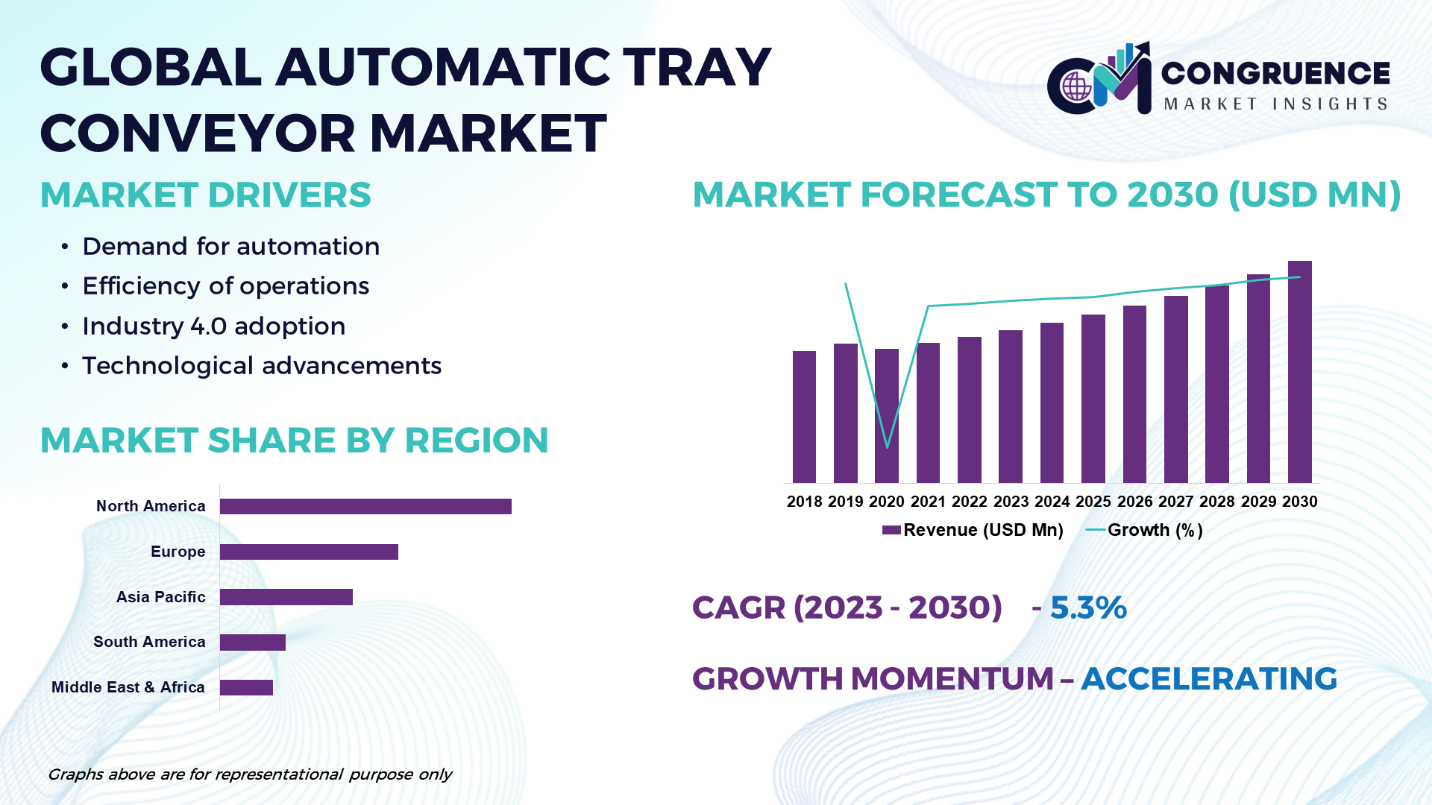Reports
The industry encompassing the manufacture, marketing, and application of conveyor systems intended to automatically transport trays or containers in a variety of commercial and industrial contexts is known as the global automatic tray conveyor market. One kind of material handling machinery that is essential to the optimization of operations in industries such as manufacturing, food and beverage, automotive, pharmaceuticals, and logistics is the automatic tray conveyor. Conveyor systems are engineered to transport trays or containers between locations within a building or between phases of a manufacturing or distribution process. The term "automatic" suggests that these conveyors have automated characteristics that lower labor requirements and increase overall productivity. To smoothly control the movement and flow of trays, these systems frequently include technology such as sensors, programmable logic controllers (PLCs), and sophisticated control systems. The effective movement of goods between different locations in a manufacturing or distribution line is a well-known feature of automatic tray conveyors. They provide advantages such as lower labor costs, more effective operations, and better product safety. Technological developments have an impact on the market as well, with manufacturers concentrating on new developments to improve the features and capabilities of automatic tray conveyor systems. The Global Automatic Tray Conveyor Market is expected to expand at a CAGR of 5.3% between 2023 and 2030.

Automatic Tray Conveyor Market Major Driving Forces
Demand for Automation: Increasing need for automation in a number of sectors, including logistics, food and beverage, manufacturing, and the automobile industry.
Businesses want to implement automated material handling systems to improve operational efficiency and save labor costs.
Efficiency of Operations: Automatic tray conveyors increase throughput, reduce mistakes, and streamline material handling procedures to improve operational efficiency.
Industry 4.0 Adoption: The application of modern technologies, such as smart sensors and the Internet of Things, to facilitate data-driven decision-making and real-time monitoring.
Technological Advancements: Constant innovation in conveyor system technology, encompassing the creation of increasingly complex and dependable sensors, control systems, and componentry.
Automatic Tray Conveyor Market Key Opportunities
Robotics Integration: To further improve automation and efficiency in operations including picking, sorting, and packing, there are opportunities to combine robotic systems with automatic tray conveyors.
E-commerce Growth: As the demand for effective and automated material handling systems rises with the volume of online orders, automatic tray conveyor manufacturers have an opportunity to broaden their customer base and increase their reach owing to the continuous growth of online retail and e-commerce platforms.
Customization and Personalization: Customized tray conveyor systems are in greater demand from customers. Manufacturers of automatic tray conveyors can provide easily adjustable, modular solutions that are tailored to meet the specific needs of various industries. Premium and niche markets can benefit from this trend, which increases client engagement and brand loyalty.
Automatic Tray Conveyor Market Key Trends
· An international trend is the incorporation of industry 4.0 concepts, which include the application of IoT (internet of things), artificial intelligence, and data analytics.
· Growing need for adaptable and versatile tray conveyor systems that meet certain industry needs with ease.
· Automated tray conveyors and robotics are being integrated to form cooperative systems.
· A movement toward creating conveyor systems that are more energy-efficient by utilizing power-saving designs and technologies.
· Adoption of modular conveyor systems, which make it simpler to extend, alter, or reorganize production lines.
· Developments in sensor technology, such as the application of smart sensors, to enhance automation, provide real-time monitoring, and forecast maintenance needs.
· A rise in e-commerce-related demand for automatic tray conveyors with an emphasis on streamlining logistical procedures.

Market Competition Landscape
The competitive landscape of the automatic tray conveyor market is marked by major competitors vying for market share and significance. Big manufacturers compete to provide cutting-edge and inventive solutions. The capacity to deliver flexible and customized conveyor systems, integrate smart technology, and satisfy the unique needs of many industries are some of the elements that fuel competition. In order to bring innovative features such as Industry 4.0 integration, energy efficiency, and collaborative robots, businesses frequently invest in research and development. Furthermore, an emphasis on worldwide market presence expansion, with a particular eye toward rapidly industrializing emerging economies which influences the competitive landscape. The competitive dynamics in the automatic tray conveyor market heavily depend on ongoing attempts to improve product quality, dependability, and safety features. Competition is anticipated to increase, spurring additional innovation and technological developments in the market as sectors prioritize automation and client needs change. Prominent players in the market include:
· Swisslog Holding AG
· Siemens AG
· Daifuku Co., Ltd.
· BEUMER Group
· Hytrol Conveyor Company, Inc.
· Interroll Group
· FlexLink AB
· Vanderlande Industries B.V.
· Bosch Rexroth AG
· Dematic (KION Group)
· Eisenmann SE
· Shuttleworth, LLC (ProMach)
· LEWCO, Inc.
· Ryson International, Inc.
· TGW Logistics Group
|
Report Attribute/Metric |
Details |
|
Base Year |
2022 |
|
Forecast Period |
2023 – 2030 |
|
Historical Data |
2018 to 2022 |
|
Forecast Unit |
Value (US$ Mn) |
|
Key Report Deliverable |
Revenue Forecast, Growth Trends, Market Dynamics, Segmental Overview, Regional and Country-wise Analysis, Competition Landscape |
|
Segments Covered |
· By Industry Verticals: Manufacturing, Food and Beverage, Retail and E-commerce, Pharmaceuticals and Healthcare · By Types of Conveyors: Belt Conveyors, Roller Conveyors, Spiral Conveyors, Modular Conveyors · By Applications: Assembly Lines, Material Handling, Packaging · By Technology: Traditional Conveyors, Smart Conveyors |
|
Geographies Covered |
North America: U.S., Canada and Mexico Europe: Germany, France, U.K., Italy, Spain, and Rest of Europe Asia Pacific: China, India, Japan, South Korea, Southeast Asia, and Rest of Asia Pacific South America: Brazil, Argentina, and Rest of Latin America Middle East & Africa: GCC Countries, South Africa, and Rest of Middle East & Africa |
|
Key Players Analyzed |
Swisslog Holding AG, Siemens AG, Daifuku Co., Ltd., BEUMER Group, Hytrol Conveyor Company, Inc., Interroll Group, FlexLink AB, Vanderlande Industries B.V., Bosch Rexroth AG, Dematic (KION Group), Eisenmann SE, Shuttleworth, LLC (ProMach), LEWCO, Inc., Ryson International, Inc., TGW Logistics Group. |
|
Customization & Pricing |
Available on Request (10% Customization is Free) |
